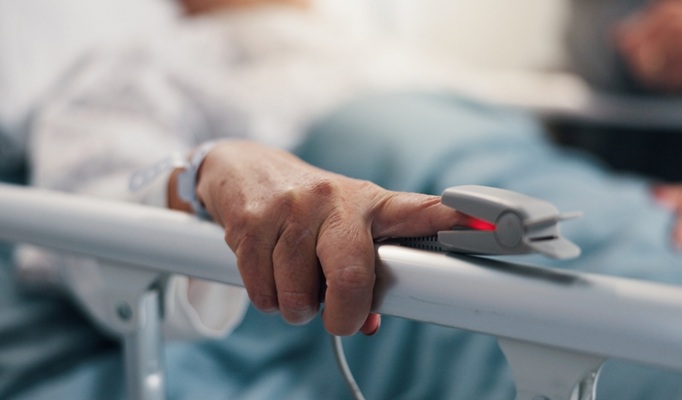Robotic Entities Could Improve Institutional Quality of Care
|
By HospiMedica International staff writers Posted on 05 Nov 2019 |
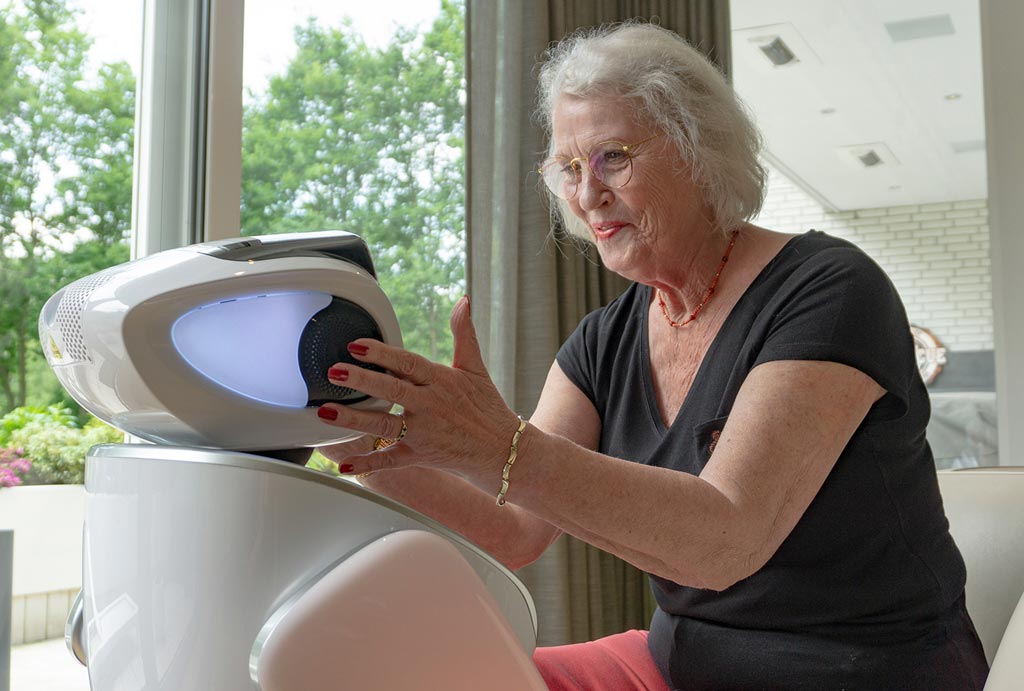
Image: A SARA robot interacting with a patient (Photo courtesy of Bright Cape).
Introducing social and autonomous robotic health assistants (SARAs) to aid nurses interacting with patients could help overcome overwhelming schedules and personnel reduction.
The SARA consortium, led by Bright Cape (Eindhoven, The Netherlands), Forum Virium Helsinki (Finland), GIM Robotics (Helsinki, Finland), the Technical University of Berlin (TUB; Germany), and other institutions, is working to introduce robots as largely autonomous social entities in nursing homes and hospitals. Using a system called SARA Home, the robots are accessible from a computer or tablet, allowing nurses to elaborate a personalized profile and health plan for every patient.
SARA robots will be used assist patients complete specific exercises several times a week, helping them to improve their mental and physical fitness. For example, the robots could ask the patient to associate a word to the right color, or to choose among different stories in order to define which one is more fit to a certain context. By interacting with the users and presenting them with such simple exercises, their mental condition could be improved, helping to escape deterioration into the second, more acute stage of dementia. Two pilot tests are currently ongoing, in nursing homes in Finland and in the Netherlands.
“We are working in particular with people who are in closed psychiatric departments suffering from dementia in a first stage,” said project manager Emmy Rintjema, of Bright Cape. “We believe that robots could give a great contribution to healthcare, not to replace nurses, but to collaborate with them and reduce their workload, so they have more time to spend with patients. We are working together with nursing homes in a collaborative approach, mimicking the work of a nurse with a robot and testing the first functionalities with them.”
The rapidly ageing population of Europe is bringing new challenges to a changing society. Hospitals and care institutions are facing serious staffing shortages, as fewer and fewer people choose to become healthcare professionals, while at the same time the number of people suffering from morbidities is constantly on the rise. Heavy work pressure has proven to be related to poor quality of care and to incidents such as medication errors, which 13.8% of nurses deal with weekly.
Related Links:
Bright Cape
Forum Virium Helsinki
GIM Robotics
Technical University of Berlin
The SARA consortium, led by Bright Cape (Eindhoven, The Netherlands), Forum Virium Helsinki (Finland), GIM Robotics (Helsinki, Finland), the Technical University of Berlin (TUB; Germany), and other institutions, is working to introduce robots as largely autonomous social entities in nursing homes and hospitals. Using a system called SARA Home, the robots are accessible from a computer or tablet, allowing nurses to elaborate a personalized profile and health plan for every patient.
SARA robots will be used assist patients complete specific exercises several times a week, helping them to improve their mental and physical fitness. For example, the robots could ask the patient to associate a word to the right color, or to choose among different stories in order to define which one is more fit to a certain context. By interacting with the users and presenting them with such simple exercises, their mental condition could be improved, helping to escape deterioration into the second, more acute stage of dementia. Two pilot tests are currently ongoing, in nursing homes in Finland and in the Netherlands.
“We are working in particular with people who are in closed psychiatric departments suffering from dementia in a first stage,” said project manager Emmy Rintjema, of Bright Cape. “We believe that robots could give a great contribution to healthcare, not to replace nurses, but to collaborate with them and reduce their workload, so they have more time to spend with patients. We are working together with nursing homes in a collaborative approach, mimicking the work of a nurse with a robot and testing the first functionalities with them.”
The rapidly ageing population of Europe is bringing new challenges to a changing society. Hospitals and care institutions are facing serious staffing shortages, as fewer and fewer people choose to become healthcare professionals, while at the same time the number of people suffering from morbidities is constantly on the rise. Heavy work pressure has proven to be related to poor quality of care and to incidents such as medication errors, which 13.8% of nurses deal with weekly.
Related Links:
Bright Cape
Forum Virium Helsinki
GIM Robotics
Technical University of Berlin
Latest Patient Care News
- Revolutionary Automatic IV-Line Flushing Device to Enhance Infusion Care
- VR Training Tool Combats Contamination of Portable Medical Equipment
- Portable Biosensor Platform to Reduce Hospital-Acquired Infections
- First-Of-Its-Kind Portable Germicidal Light Technology Disinfects High-Touch Clinical Surfaces in Seconds
- Surgical Capacity Optimization Solution Helps Hospitals Boost OR Utilization

- Game-Changing Innovation in Surgical Instrument Sterilization Significantly Improves OR Throughput
- Next Gen ICU Bed to Help Address Complex Critical Care Needs
- Groundbreaking AI-Powered UV-C Disinfection Technology Redefines Infection Control Landscape
- Clean Hospitals Can Reduce Antibiotic Resistance, Save Lives
- Smart Hospital Beds Improve Accuracy of Medical Diagnosis
- New Fast Endoscope Drying System Improves Productivity and Traceability
- World’s First Automated Endoscope Cleaner Fights Antimicrobial Resistance
- Portable High-Capacity Digital Stretcher Scales Provide Precision Weighing for Patients in ER
- Portable Clinical Scale with Remote Indicator Allows for Flexible Patient Weighing Use
- Innovative and Highly Customizable Medical Carts Offer Unlimited Configuration Possibilities
- Biomolecular Wound Healing Film Adheres to Sensitive Tissue and Releases Active Ingredients
Channels
Critical Care
view channel
Ingestible Capsule Monitors Intestinal Inflammation
Acute mesenteric ischemia—a life-threatening condition caused by blocked blood flow to the intestines—remains difficult to diagnose early because its symptoms often mimic common digestive problems.... Read more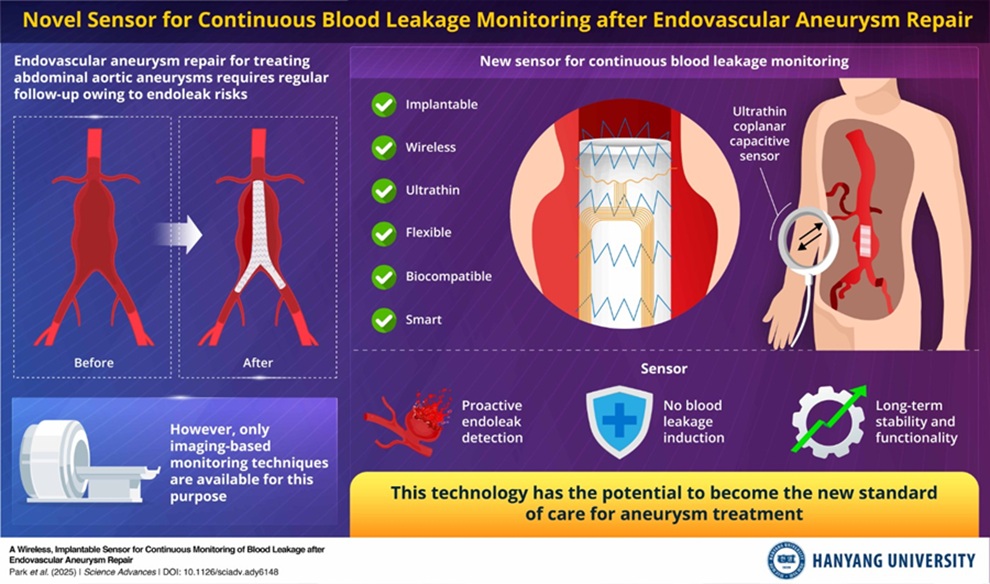
Wireless Implantable Sensor Enables Continuous Endoleak Monitoring
Endovascular aneurysm repair (EVAR) is a life-saving, minimally invasive treatment for abdominal aortic aneurysms—balloon-like bulges in the aorta that can rupture with fatal consequences.... Read more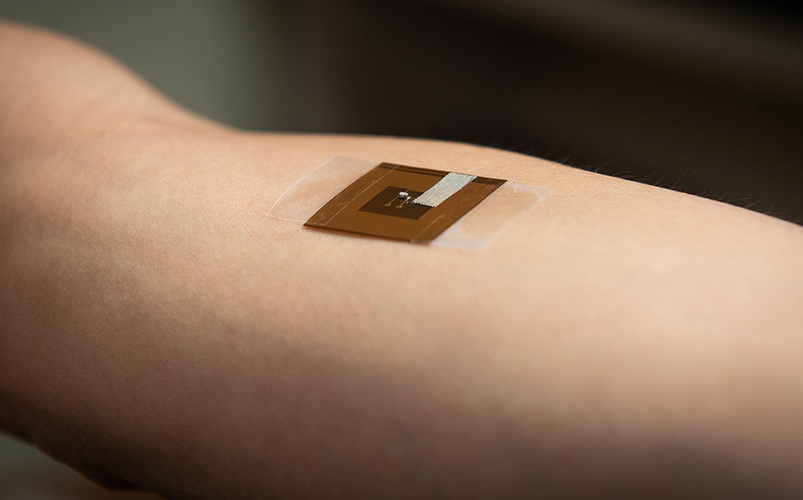
Wearable Patch for Early Skin Cancer Detection to Reduce Unnecessary Biopsies
Skin cancer remains one of the most dangerous and common cancers worldwide, with early detection crucial for improving survival rates. Traditional diagnostic methods—visual inspections, imaging, and biopsies—can... Read moreSurgical Techniques
view channel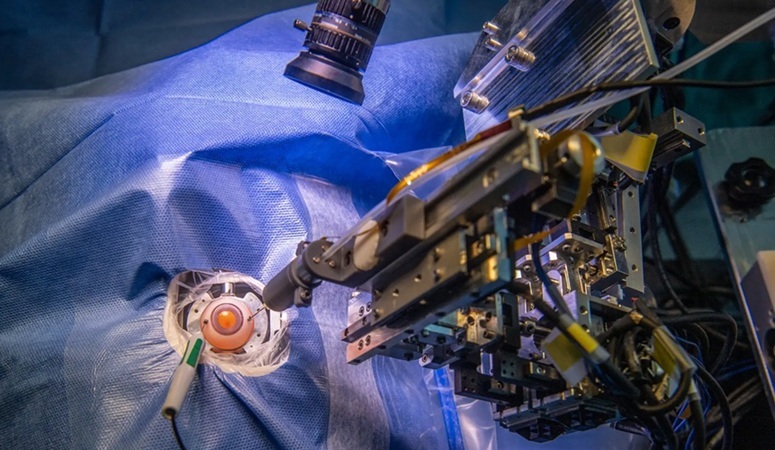
Robotic Assistant Delivers Ultra-Precision Injections with Rapid Setup Times
Age-related macular degeneration (AMD) is a leading cause of blindness worldwide, affecting nearly 200 million people, a figure expected to rise to 280 million by 2040. Current treatment involves doctors... Read more
Minimally Invasive Endoscopic Surgery Improves Severe Stroke Outcomes
Intracerebral hemorrhage, a type of stroke caused by bleeding deep within the brain, remains one of the most challenging neurological emergencies to treat. Accounting for about 15% of all strokes, it carries... Read moreHealth IT
view channel
Printable Molecule-Selective Nanoparticles Enable Mass Production of Wearable Biosensors
The future of medicine is likely to focus on the personalization of healthcare—understanding exactly what an individual requires and delivering the appropriate combination of nutrients, metabolites, and... Read moreBusiness
view channel
Philips and Masimo Partner to Advance Patient Monitoring Measurement Technologies
Royal Philips (Amsterdam, Netherlands) and Masimo (Irvine, California, USA) have renewed their multi-year strategic collaboration, combining Philips’ expertise in patient monitoring with Masimo’s noninvasive... Read more
B. Braun Acquires Digital Microsurgery Company True Digital Surgery
The high-end microsurgery market in neurosurgery, spine, and ENT is undergoing a significant transformation. Traditional analog microscopes are giving way to digital exoscopes, which provide improved visualization,... Read more
CMEF 2025 to Promote Holistic and High-Quality Development of Medical and Health Industry
The 92nd China International Medical Equipment Fair (CMEF 2025) Autumn Exhibition is scheduled to be held from September 26 to 29 at the China Import and Export Fair Complex (Canton Fair Complex) in Guangzhou.... Read more











